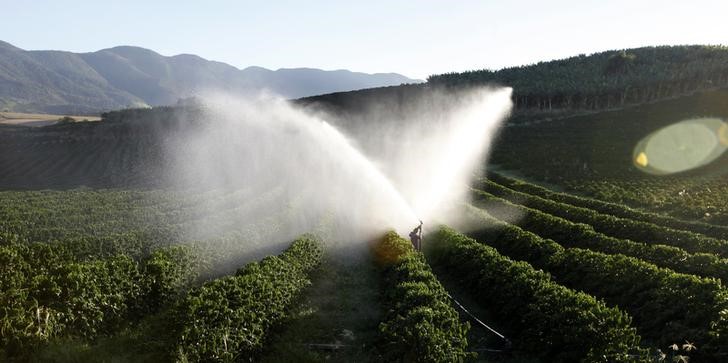(Bloomberg) -- Starbucks Corp . (NASDAQ:SBUX) is giving farmers a cushion against the blow of tumbling coffee prices, a move that could also protect supplies of the high-quality beans the company needs.
The world’s largest coffee chain operator paid over 8,000 farmers in Mexico, El Salvador, Nicaragua and Guatemala a premium totaling $20 million, according to Michelle Burns, senior vice president of global coffee and tea at Starbucks (NASDAQ:SBUX). That’s on top of the regular amounts it pays over futures prices for specialty arabica beans, she said.
With prices falling below production costs in many countries, shielding those who produce the beans the company purchases is especially important for Starbucks (NASDAQ:SBUX). Growers from Colombia to Mexico are struggling to compete with ever-rising output from top producer Brazil, where a weaker currency has meant many farmers there are still making money.
“When we looked at what the cost of production was across the range of countries, it was clear that the Latin American countries had a serious situation in hand,” Burns said in an interview. “When a premium specialty arabica coffee of the highest quality -- the arena that we play in -- has been impacted, with historically low coffee prices at around $1, there are many countries where that’s not sustainable living.”
As Brazilian output kept expanding, futures fell this year to their lowest in more than a decade on the ICE (NYSE:ICE) Futures U.S. exchange and are hovering around $1 a pound. The cost of production in Central America is at least 30% higher than in Brazil, according to Carlos Mera, an analyst at Rabobank International Ltd., a lender to the agriculture industry.
The global coffee crisis has already brought producers together, with countries calling on roasters to pay a fair prices. Colombia even considered dissociating its coffee sales from futures traded in New York. Prices are unlikely to significantly recover without intervention given the potential for increased low-cost production in Brazil, Jeffrey Sachs, professor of economics at Columbia University, said in a report this month.
With a global oversupply hanging over the market, Starbucks (NASDAQ:SBUX) said it remains committed to taking further action for the 2019-20 season that started Oct. 1. The company also helps farmers through its nine support centers and a plan to give out 100 million trees by 2025 so growers can replace their aging and diseased plants. So far, almost 32 million trees have been distributed.
Market Correction
“The desire would be that the market has some correction. That would be the ideal state,” Burns said. “If the coffee crisis on pricing continues, we will look at both what we do on the financial side as well as our continued work with what we do with trees.”
Even when the company doesn’t buy directly from farmers, it asks traders to disclose how much the grower was paid. That helps it determine whether additional payments are needed. Starbucks (NASDAQ:SBUX) wants to ensure that farmers cover their costs and make at least a small profit, according to Burns. The firm’s purchases account for 3% of global coffee production and 40% of high-quality specialty arabica beans.
The coffee industry has seen significant consolidation with closely held investment firm JAB Holding Co. spending more than $30 billion buying companies including Peet’s Coffee, Keurig Green Mountain and Caribou Coffee. Nestle SA (SIX:NESN) and Italy’s Lavazza have also jumped on the bandwagon. With increased competition, industry executives say there’s been a focus on cutting costs and buying cheaper beans.
Flavor Profiles
Global production is increasingly concentrating in Brazil and Vietnam, the world’s largest grower of the more bitter robusta variety. That’s sparked concerns that the market will lose the wide variety of tastes currently available to roasters.
“We’ve built this company around a diversity of flavor profiles from many growing regions around the world,” Burns said. “We know for certain we want farmers to stay, we want the diversity of the origins we have the privilege to buy from.”
